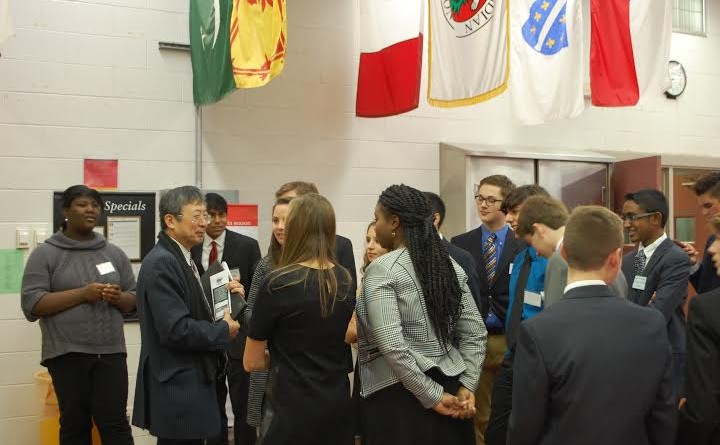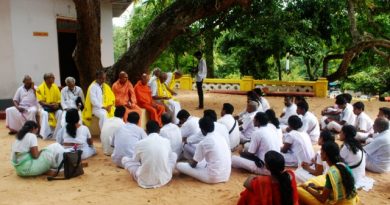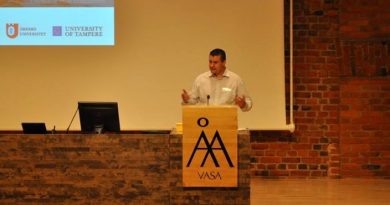Nonkilling featured at Model UN Conference in Syracuse
The Center for Global Nonkilling was the invited NGO at the Manlius Pebble Hill School Model United Nations conference, celebrated on October 24, 2015 in Syracuse, New York. CGNK Governing Council member Maorong Jiang represented CGNK at the Conference addressing the students and community in a keynote presentation reproduced below. The “Glenn Paige Nonkilling School” in the DR Congo was selected as annual charity, raising $1,400 in donations in one day.
Former CGNK Interns Hyemin Han, who served as Model UN Secretary General, and Jeongyoon Han were instrumental in bringing attention to CGNK and the “Glenn Paige Nonkilling School”. The event received much local attention, including a feature in the “Eagle News” paper, and helped raise local awareness on the possibilities of building killing-free societies.
Model UN Conference Keynote Address by Maorong Jiang
Dear Students,
It is a great privilege to be here with you today to introduce the Glenn Paige Nonkilling School in the village of Kazimia, DR Congo, as the 2015-2016 Charity of the Manlius Pebble Hill Model U.N. Also, I would like to call your attention to the unique work and free online educational resources of the Center for Global Nonkilling. Website www.nonkilling.org.
I am sure that we are all concerned with continued killing in cities and schools in America, and throughout the world. Therefore it is important for us to begin to think about achieving a future killing-free world. Most humans who have ever lived have never killed anyone. From birth to natural death there’s nothing we humans can do if we are killed. But by combining the spiritual, scientific, skills, and arts capabilities of humankind, we can make progress toward the measureable goal of a killing-free world, by means open to infinite creativity, in reverence for life. Please think about it.
The Glenn Paige Nonkilling School is located in the remote village of Kazimia on the banks of Lake Tanganyika in the Democratic Republic of the Congo, a place indeed far far away from here. That village will be famous starting from today, because you will remember it, and will not forget it and will share with friends and strangers alike. The village of Kazimia has approximately 18,000 inhabitants. People there have had to live through the horrific nightmare of massacres such as in Lulinda, Makobola, Bangwe, Baraka, and Bibokoboko. The war that raped the Eastern part of Democratic Republic of the Congo has led to extreme impoverishment of many people, has destroyed the few existing infrastructures, and has made many children vulnerable without the possibility of going to school. If you have time, please Google Kazimia, DR Congo. You will see a Map of Kazimia and information about the School for 600 children victims of war in DR Congo.
At this point, allow me to ask you to remember the name of this village, Kazimia, in the Democratic Republic of the Congo, allow me to ask you to remember the name of this village, Kazimia, in Africa, and allow me to ask you in our beloved country, the United States, to remember the name of this village, Kazimia. Yes, we will remember the name of the village Kazimia, in English, in French, in Chinese, in Japanese and in all languages. There is a reason for me to ask you to remember Kazimia. I know some of your fellow students here know the reason, although only 216 people on the worldwide web have looked up this remote village.
My reason for asking you to remember Kazimia is because Kazimia is the location of the first Nonkilling Primary School in the world. The full name of that school is Glenn Paige Nonkilling School. The “Glenn Paige Nonkilling School” in DR Congo was founded in 2006 and was named for an American professor Glenn D. Paige, “whose writings have aided nonkilling work in Burundi, the DR Congo and Rwanda.” The School provides nonkilling and nonviolence teachings in addition to classic teachings beginning in kindergarten. As part of its innovative program, the school introduced curriculum focused on nonkilling following Glenn Paige’s book titled Nonkilling Global Political Science (readable online at www.nonkilling.org). Bishop Mabwe Lucien of the Pentecostal Assemblies of God churches in Congo informed me that the Glenn Paige Nonkilling School plans in 10 years to teach 6,000 vulnerable children who will become a source of nonkilling leadership and citizenship in the Great Lakes Region of Africa.
Today, more than 200 pupils, who have been affected by war, disease, or abandonment, learn about “nonkilling” in a simplified Kiswahili version of Dr. Paige’s book Nonkilling Global Political Science, as well as in French and English. The School also provides breakfast, health care, and clothing for its students.
In addition to teaching, Glenn Paige’s Nonkilling Global Political Science in the School, unschooled adult villagers in the surrounding area have been approached as well. The concept of Nonkilling was “new and revolutionary,” says Bishop Mabwe Lucien. “Nobody in the region had heard these ideas.” Here is some information I want to share with you on what the founders of the School have been doing in the area: 1,100 people went through a nonkilling training program; 4,500 copies of Glenn Paige’s book in Kiswahili were distributed in 1,100 villages and towns; and 30,000 more people have help to spread the case for Nonkilling alternatives in the area, causing the level of violence to drop, says Bishop Mabwe Lucien.
“The impact of the teachings of Prof. Glenn Paige is enormous,” the Bishop adds. “They have transformed the region.” The well-known Brazilian Peace Linguist and Nonkilling Poet, Francisco Gomes de Matos, wrote a poem when the Nonkilling School was founded in a least expected place in the world. The poem was titled: “Glenn Paige Nonkilling Schools: A Plea”:
“To establish a school aimed at genocide-prevention education
calls for a compassionate, courageous, Nonkilling transformation
In the village of Kazimia, Eastern Congo, a Glenn Paige Nonkilling School can be found
where children -victims of war, disease, abandonment – now hear a Life-improving sound
May that pioneering African initiative become globally known
and the good seeds of Nonkillingly-inspired schools will be sown.”
What a great school with remarkable ambitions. However, the hardships of running the Nonkilling School are beyond our imagination. But the children and their teachers have a big dream, and they need us to assist them to make that dream come true. Today, I am privileged to pass this dream to you on this beautiful campus in Syracuse of the American Empire State. Surely the dream for a nonkilling world in the Village of Kazimia, DR Congo is the same as ours in Syracuse, in the United States. It is a dream of all humanity.
Dear students, I do not know what to say about my last point; that is: what contribution can each of us make to a world that is killing-free today and tomorrow? I am positive that is not nearly enough to say “Thou Shalt No Kill.” Let us follow the example of the Glenn Paige Nonkilling School and do the best we can to stop killings around us, stop killings at individual, family, community, state, national, and global levels. We admire the initiative of the people of Kazimia. They are poor but strong; they are foreign but friendly; they are Africans sharing our dream; they are far far away but in our hearts.
Finally, on behalf of the Glenn Paige Nonkilling School in Kazimia, thank you for your historic generosity in selecting it as the 2015-2016 Charity of the Manlius Pebble Hill Model U.N. Conference. It is a privilege to introduce the School to you today, and the related work of the Center for Global Nonkilling.
Maorong Jiang
Member, Governing Council, Center for Global Nonkilling
Director, Asian World Center, Creighton University
Founder, Asian World Nonkilling Consortium



